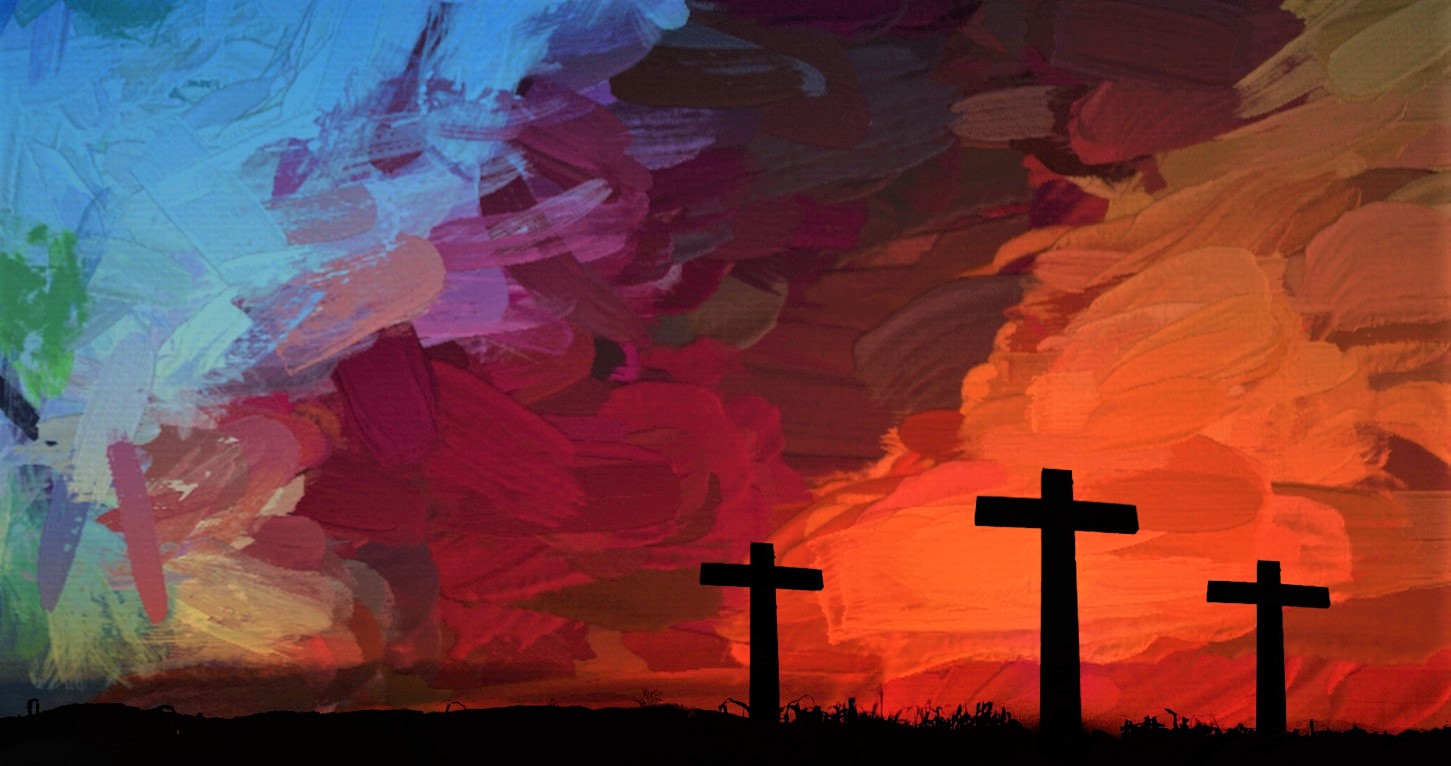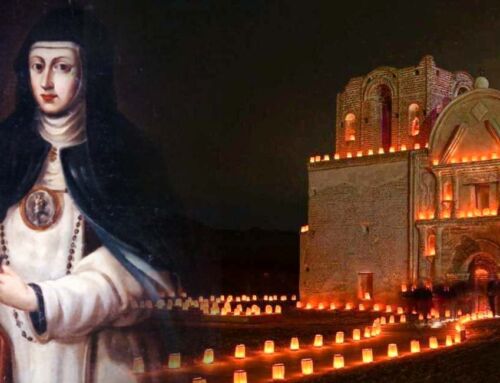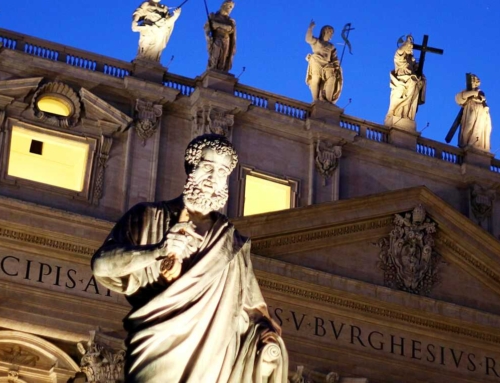Roman Catholics venerate the extraordinary 4th century poet and writer known as St. Ephrem the Syrian. St. Ephrem is a canonized saint in both the Roman Catholic and the Syriac Orthodox Church and was named a Doctor of the Church by Pope Benedict XV in 1920.
Ephrem served as a deacon in his homeland of Nisbis [modern day northern Turkey], before the Church was divided between East and West. When Ephrem was just a boy, the Emperor Constantine issued the Edict of Milan (313 AD), which ended all persecutions of the Church and allowed Christianity its full freedom of worship. Thereafter, Ephrem spent his ministry singing the praises of the mysteries of the Catholic Faith and defending the teachings of the Nicene Creed. St. Ephrem died in 373 while serving victims of the plague.
In St. Ephrem’s hymns we feel the freshness of a clear-sighted preacher of truth in a young, growing Church. Like every good preacher, he uses rich, vivid images to communicate his point and ends with a rousing exhortation to fidelity to Christ and the sacred mysteries.
You can easily find more of St. Ephrem’s preaching and poetry on the Internet, and you will be greatly enriched by your searches. May St. Ephrem’s marvelous sermon on the Cross inspire you today and strengthen you as you walk your spiritual journey.
The Sermon
Death trampled our Lord underfoot, but he in his turn treated death as a highroad for his own feet. He submitted to it, enduring it willingly, because by this means he would be able to destroy death in spite of itself. Death had its own way when our Lord went out from Jerusalem carrying his cross, but when by a loud cry from that Cross he summoned the dead from the underworld, death was powerless to prevent it.
Death slew him by means of the body which he had assumed, but that same body proved to be the weapon with which he conquered death. Concealed beneath the cloak of his manhood, his godhead engaged death in combat; but in slaying our Lord, death itself was slain. It was able to kill natural human life, but was itself killed by the life that is above the nature of man.
Death could not devour our Lord unless he possessed a body, neither could hell swallow him up unless he bore our flesh; and so he came in search of a chariot in which to ride to the underworld. This chariot was the body which he received from the Virgin; in it he invaded death’s fortress, broke open its strong room and scattered all its treasure.
At length he came upon Eve, the mother of all the living. She was that vineyard whose enclosure her own hands had enabled death to violate, so that she could taste its fruit; thus the mother of all the living became the source of death for every living creature. But in her stead Mary grew up, a new vine in place of the old. Christ, the new life, dwelt within her. When death, with its customary impudence, came foraging for her mortal fruit, it encountered its own destruction in the hidden life that fruit contained. All unsuspecting, it swallowed him up, and in doing so released life itself and set free a multitude of men.
He who was also the carpenter’s glorious son set up his Cross above death’s all-consuming jaws, and led the human race into the dwelling place of life. Since a tree had brought about the downfall of mankind, it was upon a tree that mankind crossed over to the realm of life. Bitter was the branch that had once been grafted upon that ancient tree, but sweet the young shoot that has now been grafted in, the shoot in which we are meant to recognize the Lord whom no creature can resist.
We give glory to you, Lord, who raised up your Cross to span the jaws of death like a bridge by which souls might pass from the region of the dead to the land of the living. We give glory to you who put on the body of a single mortal man and made it the source of life for every other mortal man.
You are incontestably alive! Your murderers sowed your living body in the earth as farmers sow grain, but it sprang up and yielded an abundant harvest of men raised from the dead.
Come then, my brothers and sisters, let us offer our Lord the great and all-embracing sacrifice of our love, pouring out our treasury of hymns and prayers before him who offered his Cross in sacrifice to God for the enrichment of all.
~St. Ephrem the Syrian (306-373 AD)
Soul Work
How fervent is your faith in Christ, your personal relationship with Him? He left Heaven, conquered the devil, put an end to death by rising from the dead, and He did it all for you – as if you were the only person in the world who needed saving.
In his sermons and hymns, St. Ephrem focused his attention like a spotlight on various aspects of the life of Christ and contemplated His Truth, Beauty and Goodness deeply. Like Ephrem, each of us is called to consider the mystery of Christ in the ways that are most meaningful to us.
What aspect of Jesus and His Life do you admire most? Consider all the biblical and devotional images of Him: the babe in the manger; the Good Shepherd; the Sacred Heart; the Divine Mercy; the Crucified One; the Risen One. Which one most touches your heart?
Make that image your prayer today. And then, find a way to give Him to someone else, as St. Ephrem has given Him to you.
—
Source: St. Ephrem of Syria, Sermo de Domino nostro, 3-4, 9: Opera edit. Lany, 152-158, 166-168; cited in Vol. II, Liturgy of the Hours, Catholic Book Publishing Co.: New York, NY, 1976, pp. 734-36.




Good Morning, Heard about this Saint for the 1st time from Father Ricardo on a Acts 29 retreat. St . Ephrem writings are well just WOW!!. After reading ‘Death trampled Our Lord” It put a lot of pieces together for me about the life of Christ and his Passion. I am a convert of 40 years. I am now 70 years old it is fun to discover the “Fathers of the Church” and the power of the Lord.
So glad you liked it, Richard! You really can’t get enough of the Fathers of the Church. Ephrem is one of the most eloquent, an expression of the pure exuberance of the early Church. Thanks for reading. I hope to highlight this piece specifically as we get closer to Holy Week. Blessings!
God bless you
Hello Amare, thank you for the blessing! You too. All the best.